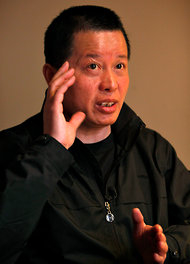China Revokes Probation of Missing Human Rights Lawyer

By SHARON LaFRANIERE
The New York Times
Published: December 16, 2011
BEIJING — China’s official news agency reported on Friday that Gao Zhisheng, a prominent human rights lawyer who has been missing for more than 20 months, will serve the next three years in prison because he repeatedly violated his probation.
The brief statement from a Beijing court provoked fresh outrage among human rights advocates who characterize Mr. Gao’s case as a leading example of abuse of dissidents in China. Although said to be free on probation for the past five years, Mr. Gao has been missing for much of the time since he was sentenced in 2006 for inciting subversion of state power.
His older brother, Gao Zhiyi, told the group China Human Rights Defenders that the court’s announcement proves that Mr. Gao has been in police custody even though the public security authorities have insisted that they had no knowledge of his whereabouts. Gao Zhiyi said he last saw his brother in April 2010 in the custody of public security officers; he is worried that his brother may be dead.
Renee Xia, one of the directors of the human rights group, said that the court’s declaration “is the clearest acknowledgement to date by the Chinese government that it has secretly detained Gao for the last 20 months despite its repeated denials.”
Human rights advocates say secret detentions and disappearances have become a common tactic for Chinese authorities to suppress dissidents, especially since February, when the government began to fear that the Arab Spring uprisings would spread to China. The government is currently considering revising its criminal procedure law in a manner that human rights lawyers say would effectively legalize secret detentions.
Western governments and the United Nations have persistently pressed China to release Mr. Gao, 47, who once defended practitioners of Falun Gong, a religious group banned in China.
In March, a United Nations working group on arbitrary detention said Mr. Gao’s unexplained disappearance amounted to punishment for his defense of human rights.
Nicholas Bequelin, a researcher for Human Rights Watch, said the announcement did not alleviate concerns about Mr. Gao’s treatment or whereabouts.
“The people who saw him more than 20 months ago described him as a ghost,” Mr. Bequelin said. “We have absolutely no details about his condition now.” Amnesty International said in a statement that Mr. Gao had already been held captive for much longer than his original three-year prison term that had supposedly been suspended.
Jerome A. Cohen, a specialist on the Chinese legal system, said Mr. Gao was clearly a victim of “extra-legal punishment.” He said in an e-mail: “I have used the case repeatedly as a leading example of a disturbing trend of lawlessness on the part of China’s police. Now they have belatedly found the figleaf.”
Mr. Gao was known for taking on politically sensitive cases. He was sentenced to probation in December 2006, and subsequently disappeared three times. During the short periods when he resurfaced, he told reporters that he had been tortured.
At various points, he said, he was beaten with electric batons and handguns, forced to wear a hood over his head, tied up with belts, made to sit motionless for up to 16 hours and threatened with death. He said one guard told him: “You must forget you are human. You are a beast.”
After her husband’s 2006 conviction, Mr. Gao’s wife fled to the United States, where she now lives with his daughter. According to one supporter’s account, Mr. Gao may have also tried to escape but was caught.
Mia Li contributed research.
